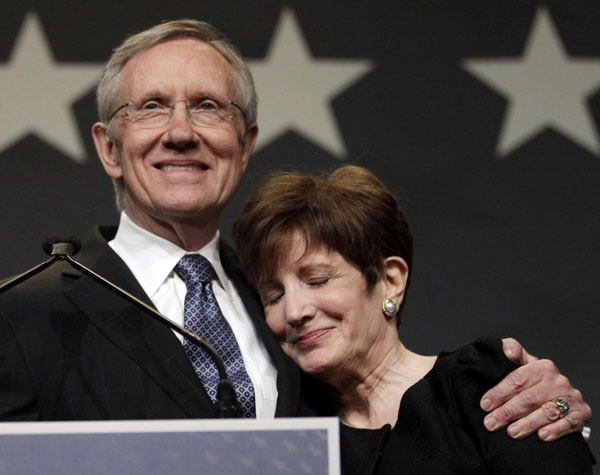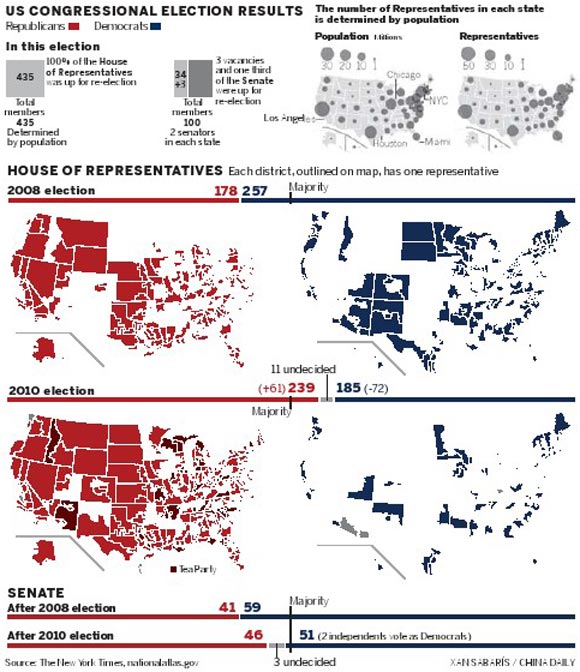Asia-Pacific
Republicans in control of House
By Cheng Guangjin and Tan Yingzi (China Daily)
Updated: 2010-11-04 07:25
 |
Large Medium Small |
Takeover creates divided government, but analysts believe result unlikely to change Sino-US ties
 |
|
US Senate Majority Leader Harry Reid, who faced Tea Party favorite Republican Sharron Angle in his race for re-election, celebrates his victory with his wife Landra at an election night party in Las Vegas, Nevada, on Tuesday. [Photo/Agencies] |
BEIJING / WASHINGTON - Republicans rode a wave of voter discontent and conservative outrage to capture control of the House, but Democrats narrowly retained control of the Senate in midterm elections on Tuesday.
A Republican takeover of the House of Representatives will create a divided government, complicating US President Barack Obama's agenda. Republicans have said they want to cut $100 billion in spending in a year and roll back Obama's overhaul of healthcare and financial regulations.
But analysts said the result is unlikely to change the general picture of Sino-US relations, though it may complicate the Obama administration's China policy.
Democrats captured only three Republican-held seats.
By early Wednesday, the Republicans had captured 239 seats and were leading in four more, while Democrats had won 185 and led in seven.
Before the election, Democrats controlled the House by a 255-178 margin, with two vacancies. All 435 seats were on the ballot.
But Democrats were guaranteed of holding at least 50 of the 100 Senate seats with a handful of close races still outstanding, according to projections based on CNN's analysis of exit poll data.
With the realities of divided government sinking in, Obama made a late-night call to congratulate John Boehner, who is in line to become the next House speaker, and discussed ways they could work together to create jobs and improve the economy.
 |
|
John Boehner is in line to be new House majority leader. |
Obama has to listen more to Congress on issues, including China, "rather than acting mostly at the White House's will", said Yuan Peng, director of the Institute of American Studies at the China Institutes of Contemporary International Relations.
"This means a bigger challenge for China in dealing with the US" as it will have to talk not only with the Obama team but also with Congress, said Yuan, noting that tough voices raised against China are not uncommon on Capitol Hill.
Yuan also noted that key changes in the House, such as Nancy Pelosi giving up the speaker's gavel, are likely to add fuel to the fire on China-related issues.
The yuan revaluation was in the spotlight before the midterm elections, which some analysts said was used by US politicians to garner votes by turning China into a scapegoat for the faltering US economy.
Yuan said the midterm elections would not bring an end to China bashing, which could continue in the run-up to the 2012 presidential election, when "both parties are going to focus on the economy". Without an improvement, both parties might try to find a scapegoat and "obviously China is going to be a popular choice".
Shen Dingli, director of the Center for American Studies at the Shanghai-based Fudan University, said that although the Obama administration, on the whole, favors a stable China-US relationship, its China policies "will surely be affected" by the results.
But Shen is upbeat about the future. "As China's national strength grows, a better Sino-US relationship is the historical trend", and this will not be derailed by a single election, Shen said.
Fan Jishe, a professor of American studies with the Chinese Academy of Social Sciences, said he believed "the current China-US relationship is unlikely to be changed by an election, at least before President Hu Jintao's visit to Washington next year".
Haipei Shue, a Democratic campaign adviser, was even more optimistic.
"There is in fact some good news from the results for US-China relations," he told China Daily.
"China should feel relieved after Senate Majority Leader Harry Reid defeated Republican Sharron Angle in Nevada."
If Reid lost the race, he said, New York Senator Charles Schumer, who has focused on the currency issue since 2005 and is a union ally, would most likely be the new majority leader.
The likely House minority leader will be Steny Hoyer, who consistently voted for giving China most-favored-nation status in the 1990s, often against his own party. "His pro-business stance will be less confrontational with China and more in tune with the business community," Shue said.
And as the new Congress focuses on the US economy, it will increase pressure on bilateral trade relations.
"If there are tensions with the new Congress, I would look for them to be related to economic issues, such as currency, the trade surplus, and rare earths," Douglas Paal, vice-president for studies and senior associate, Asia Program, at the Carnegie Endowment for International Peace, told China Daily.

Tan Yingzi reported from Washington, and Ma Liyao contributed to this story.




